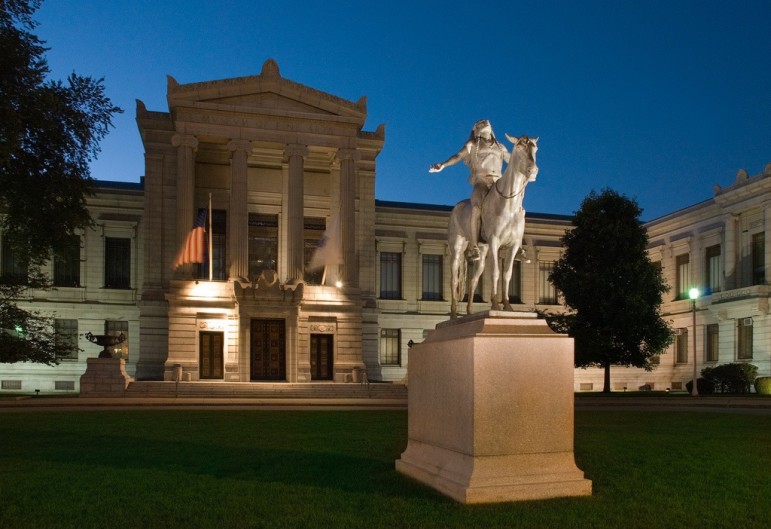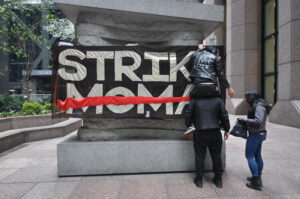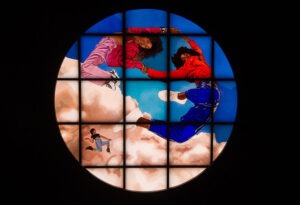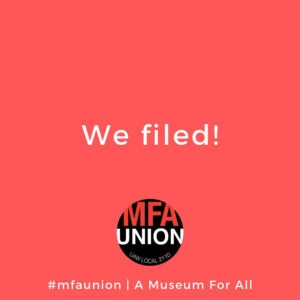
December 15, 2015; Hyperallergic.com
For the past three weeks, guards who usually serve to protect the treasures of the Boston Museum of Fine Arts (MFA) have instead been walking the pavement outside. Members of the Museum Independent Security Union (MISU) object to changes that museum officials want to make to reduce flexible scheduling and the coverage they’ve provided inside the galleries to assist patrons and protect the art. According to Hyperallergic.com this week, MISU president Evan Henderson explained the guards’ position saying the proposed changes are “pushing guards out of their positions,” and would “reportedly be less focused on providing artwork protection and guest support within the galleries, and require them to cover shifts in areas of the museum like the attic, offices, or outdoors.”
Henderson was quoted in the Boston Globe saying, “They want us to be more like unlicensed cops, in which we’ll be more militarized…. We’ll be doing, like, drills in the morning. They want us to not focus on the artwork and be able to fight things like active shooters.”
Protecting visitors and property in public venues is increasingly complex, and according to R. Michael Kirchner, chairman of the security committee for the American Alliance of Museums, there’s no single template. “It varies worldwide because of the different size of facilities and resources.” Each museum has its own security challenges and priorities.
Boston MFA’s public relations director Karen Frascona explained the museum’s stance: “In today’s environment, it is critical that our security workforce is prepared to protect our staff, students, volunteers, visitors, and the collection in a variety of situations. Industry-standard training in areas such as emergency preparedness, conflict resolution, and security operations is included in the MFA’s current plan.” But Henderson and the nearly 100 guards who are opposing the changes are concerned the new policies would hinder their ability to aid visitors and provide them with a friendly experience.
According to the Globe article, “Frascona declined to describe details of the MFA’s security system, citing its sensitive nature.” But Steve Keller, a museum security consultant, said, “The MFA is in the forefront of a broader trend among museums to adopt technologically advanced security systems.” Keller added, “The museum uses a predictive video monitoring system that incorporates ceiling-mounted cameras and video analytics to sound an alarm before a person actually touches an artwork.”
Sign up for our free newsletters
Subscribe to NPQ's newsletters to have our top stories delivered directly to your inbox.
By signing up, you agree to our privacy policy and terms of use, and to receive messages from NPQ and our partners.
He said the MFA’s system goes “beyond what most museums do,” by enabling the museum to statistically analyze audience movement patterns to determine which artworks (and even which parts of an artwork) are vulnerable to damage.
But Henderson and others are not convinced that even such good technology can do the job well. As one guard put it, people don’t always respond correctly to alarms, even when they hear them. Then there’s the personal touch they feel will be lost. Henderson said, “Customer service was a huge aspect of the job. We all take great appreciation in the artwork that we’re around. We’re very knowledgeable.”
He’s quoted in DigBoston, saying, “With the ‘new security model’ and ‘take it or leave it’ schedules, people are being laid off through attrition,” since many work their schedules around childcare or other jobs.
Currently, according to the Globe, “Guards can work shifts of varying lengths. Frascona said the museum was working to standardize the guards’ schedules, creating regular day, evening, and overnight shifts, starting Jan. 3rd.” According to the guards’ current contract, the museum “retains the right to alter the guards’ schedules independent of negotiations.”
In response, Henderson is considering filing a complaint with the National Labor Relations Board. And this Saturday, December 19, the Massachusetts Jobs with Justice coalition is sponsoring a rally from 12 to 2 p.m. to support the guards. — Susan Raab












